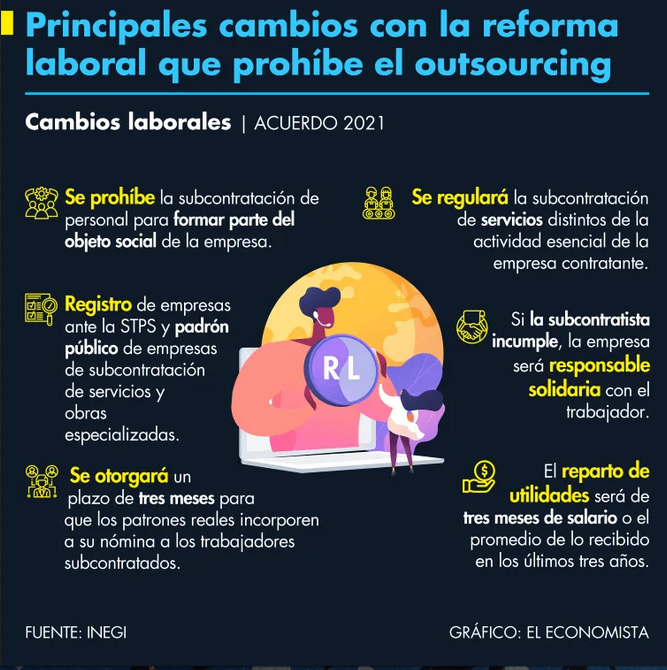Note published on April 13 in Factor Capital Humano, Leyes y Gobierno [Laws and Government] Section by Gerardo Hernández
Read original source
With no going back on the amendments to the LFT [Federal Labor Law], labor lawyers advise companies to make internal adjustments to adapt to the new regulatory framework for outsourcing that will prohibit personnel subcontracting.

Once the reform on outsourcing matters is published, the Federal Labor Law will be clear: labor subcontracting will be prohibited, and it will be an illegal mode. “This has got to be taken seriously”, emphasized Óscar de la Vega, partner at the D&M Abogados Firm.
This Tuesday night, the House of Representatives approved the ruling for the amendment of the regulatory framework on subcontracting, the memorandum will pass to the Senate for its discussion and voting.
Among the changes to be made to the LFT, personnel subcontracting will be prohibited, understanding it as the practice in which a company provides or makes its own workers available for the benefit of another.
On the opposite side, the legal framework would allow subcontracting specialized services, provided that they are not part of the business purpose and the main economic activity of the contracting organization.
Violating the new legal precepts could imply fines of up to 4.5 million pesos and a jail sentence, given that illegal subcontracting will be considered as tax fraud.
From the perspective of Óscar de la Vega, the approval of the reform in the current terms would have two immediate effects when it is promulgated: the modes of insourcing and personnel supply companies will no longer be possible.
“If you have insourcing or human capital companies, these are the topics that we would highlight in red, because they need to be restructured in a different manner”, said the specialist in the Labor subcontracting seminar organized by the Skatt Firm.
The labor lawyer suggested that companies that used third-party hiring services conduct the necessary restructuring to avoid the practices that will be prohibited and, therefore, consequences of a tax, labor and even a criminal nature.
With the proposed amendments to the Federal Labor Law, human capital agencies will be able to offer recruitment, personnel selection and training services, but without assuming the role of employers of the people that they place in companies that hire their services.
“Another important premise within the current regime is that there cannot be companies or corporations without workers and, as there is now a close coordination between the Department of Labor, the Department of the Treasury and Social Security, it will be easy to identify those companies that have high invoicing and low or null labor costs, and they will surely be subject to inspection. First, it is necessary to have that focus, that the practice will be illegal, it will be improper, and it is necessary to review the schemes we have”, said Óscar de la Vega.
The discussion around the regulation of labor subcontracting was suspended in November 2020, after the Executive Power sent its proposal to the House of Representatives and the private sector requested a deeper analysis of some aspects.
After three months of tripartite dialogue, the government accepted making modifications to the initial project, allowing a cap on employee profit sharing, a period for making internal adjustments within organizations and outsourcing of specialized services when two criteria are met: when the object of the business or its main activity are not subcontracted.

|
Key changes with the labor reform that prohibits outsourcing |
||
| Labor changes | 2021 AGREEMENT | ||
| Subcontracting of personnel to be part of the corporate purpose of the company is prohibited.
Registration of companies before the STPS [Department of Labor and Social Welfare] and the public registry of companies subcontracting specialized services and works. A term of three months will be granted for the true employers to incorporate subcontracted workers into their payroll. |
Subcontracting of services different from the essential activity of the contracting company will be regulated.
If the subcontractor fails to comply, the company will be jointly liable toward the worker. Profit sharing will be of three months of salary or the average of the amount received in the last three years. |
|
| SOURCE: INEGI [National Institute of Statistics and Geography] | ILLUSTRATION: EL ECONOMISTA | |
Employer substitution
How will the migration of workers from service providers to operating companies be conducted? Óscar de la Vega recommended doing it through employer substitution. “It is the same employment relationship, only the employer changes, the employment relationship subsists. It is a concept that was established to protect workers, not to facilitate corporate transactions.”
For her part, Cristina González, partner at González Medina Asesores, explained that employer substitution will take place when subcontracting companies transfer workers to the beneficiary organizations. These changes must be made within the three months after the entry into force of the reform decree and the transmission of assets between the substituted and the substitute employer will not be necessary.
“The substitute employer must acknowledge the legal rights of said workers, including their seniority and the defined occupational hazards”, explained the specialist.
Cristina González said that although there are many companies that have an employer registration by class to cover the different activities being conducted, the approval of the reform on subcontracting only gives them 90 days to modify this scheme, before the Mexican Social Security Institute cancels these registrations.
“Employer registrations by class are no longer an option, they will not exist. Companies will have to be classified according to their activity, in accordance with the catalog of activities provided for in the Social Security Law. This is a very important change”, she stated.





